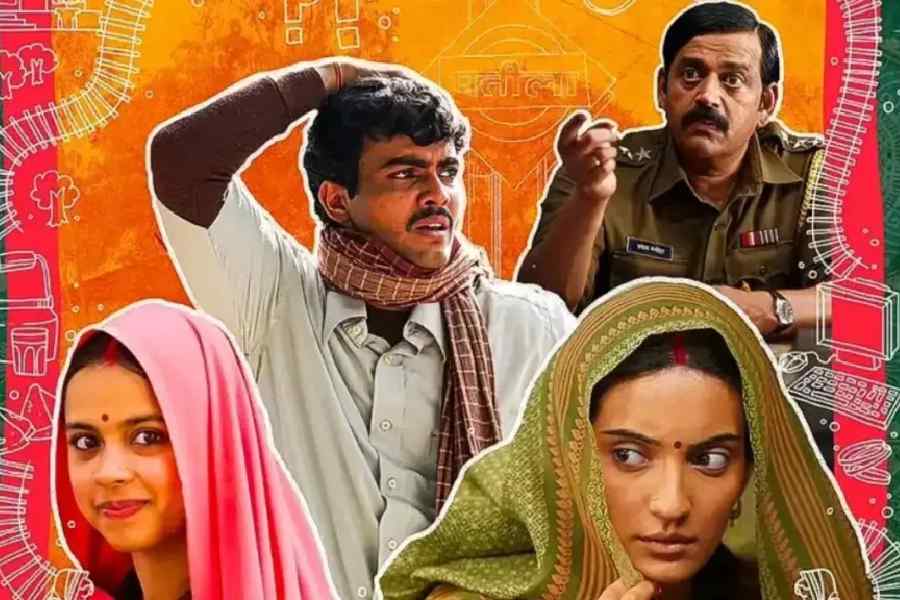There is a universality to women's experiences across classes and a lot of it goes unrepresented in cinema, says director Kiran Rao who has attempted to tell a story of self-discovery through two brides in her critical hit "Laapataa Ladies".
The film, which had its world premiere at the 2023 Toronto International Film Festival, released in India to glowing reviews on March 1 and is still enjoying a run in theatres.
Rao, who promoted her second directorial effort across tier-one cities and small towns, said the women she met have probably not experienced being under the veil, but they could still identify with the issues explored in the movie, set in rural India in the year 2001.
"There's some sort of universality in a woman's experience across classes and a lot of that goes unacknowledged, unseen or unrepresented in cinema," the filmmaker told PTI in an interview.
"Hearing the response to the film, I realised that it's possible to change the status quo with very small interventions and reclaim some space for ourselves, even within the setup that we, maybe, cannot change. That has been nice to hear from women," she said.
"Laapataa Ladies" is a satirical drama revolving around two young brides, Phool and Jaya, who get swapped during their journey to their in-laws' but the comedy of errors, propelled by the long veil, ends up being an empowering journey for both.
The hope, post the movie's theatrical run, is to take it to the nooks and crannies of the country where a story like this may make a difference, Rao said. "I'm still basking in the love that I'm getting and hoping that more people go and watch it if they have not seen it yet. Going forward, we want to collaborate with organisations that work with communities on gender and women's issues.
"I have put a word out to people I know in the social sector... I really hope to take the film to villages. It's not a short-term plan, we'll build organically." The director said "word of mouth" has been her biggest support in taking the film, which stars Nitanshi Goel, Pratibha Ranta, Sparsh Srivastav, and Ravi Kishan.
"I'm grateful for that because it means there are people who will go out to watch a film without stars only on the basis of the trailer," she added.
There have been some lessons along the way as well for the filmmaker, whose last release was her debut "Dhobi Ghat" in 2011. "You need a multi-pronged marketing campaign to reach people across the country because we have a diverse audience. There are some things that I would do differently when I make my next one," she said.
Film promotions can be hectic but Rao was able to find some moments of quiet by taking detours and spending time with her parents in Bengaluru.
"It's been crazy but in between promotional trips, I went to Bangalore, I could spend a night with my parents. And that's always wonderful because the comfort of just hearing your parents puttering around, having that morning cup of coffee with them, not necessarily needing to talk if you don't want to, but also having loads to share with them, helped me along through it all," she said.
The director said she also managed to have "little expeditions" on her own while travelling from one city to another to promote "Laapataa Ladies", which she backed via her Kindling Pictures alongside Aamir Khan Productions, the company run by former actor husband.
Rao, who worked as an assistant director on films such as "Lagaan" and "Monsoon Wedding" and produced "Taare Zameen Par" and "Peepli Live", has many more stories planned and hopes that the gap between her movies will not be long.
Filmmaking, she said, was something she stumbled into accidently during college.
The filmmaker, born in Bengaluru and raised in Kolkata, completed her graduation from Sophia College, Bombay University and then joined Jamia Millia Islamia University in New Delhi, for a masters programme in mass communication.
"I didn't know I wanted to make films. After my graduation from Sophia College, I knew I wanted to do something in the arts but I was not sure what. I also didn't want to commit to FTII (Film & Television Institute of India) which was a five-year course at the time," she said.
Rao joined Jamia Millia Islamia's mass communication course and thought she may get into broadcast journalism.
"In the second year, you study the moving image mediums and when I was doing that, I became interested because we got to watch amazing filmmakers from across ages.
"By the final year, I was like, 'I want to direct'. That's when the penny dropped. I was lucky to have great professors, a wonderful faculty and a great institution that encouraged free thinking."
Except for the headline, this story has not been edited by The Telegraph Online staff and has been published from a syndicated feed.











